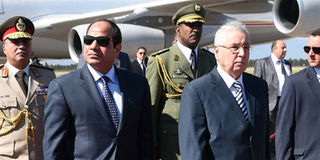Egypt president defends army overthrow of Islamists

Egypt’s president Abdel Fattah al-Sisi (second left) is welcomed by Algerian Senate speaker Abdelkader Bensalah upon his arrival at Houari-Boumediene International Airport on June 25, 2014. Sisi and his supporters say tough measures are needed as authorities are fighting an insurgency in northern Sinai by militants who have pledged allegiance to the Islamic State group. PHOTO | AFP
What you need to know:
- Millions took to the streets of Cairo and other cities on June 30, 2013 to call for the removal of Islamist President Mohamed Morsi, whose one-year rule had been deeply divisive.
- Thousands have been jailed, including secular activists who fuelled the January 2011 uprising that ended long-time president Hosni Mubarak's rule.
CAIRO
Egypt's President Abdel Fattah al-Sisi on Thursday described as a "revolution" the protests that led to the army ousting his Islamist predecessor, in remarks on the third anniversary of the demonstrations.
Millions took to the streets of Cairo and other cities on June 30, 2013 to call for the removal of Islamist President Mohamed Morsi, whose one-year rule had been deeply divisive.
Sisi, then the army chief, gave Morsi a 48-hour ultimatum to respond to "the people's demands" before ordering the military to overthrow and detain him.
Egypt is celebrating "this revolution, with which the Egyptian people have regained their identity and corrected its path... proved to the whole world that their will cannot be broken nor curbed," Sisi said in a speech broadcast on national television."
His decision to order the removal of Morsi unleashed protests by the Islamist's supporters, and in turn a crackdown in which hundreds of demonstrators were killed.
Sisi army chief was elected president a year later.
But many of his backers at the time now say the authorities' crackdown against Morsi's Muslim Brotherhood has expanded to include any kind of dissent or opposition.
Since Morsi's overthrow, more than 1,000 protesters have been killed in clashes, including more than 600 killed in a single day on August 14 when police dispersed a Cairo protest camp demanding his reinstatement.
Thousands have been jailed, including secular activists who fuelled the January 2011 uprising that ended long-time president Hosni Mubarak's rule.
The government denies there are political prisoners and says those in jail — who include a number of journalists — have all committed crimes.
Sisi and his supporters say tough measures are needed as authorities are fighting an insurgency in northern Sinai by militants who have pledged allegiance to the Islamic State group.
But critics say the crackdown has instead helped radicalise more moderate political Islamists while strengthening jihadists who disavowed their democratic approach.





